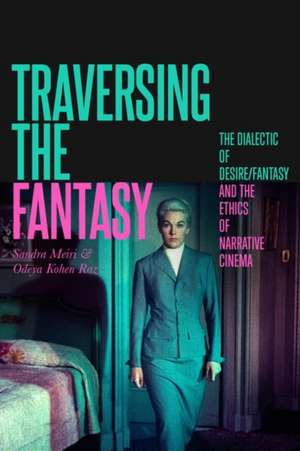Traversing the Fantasy: The Dialectic of Desire/Fantasy and the Ethics of Narrative Cinema
Autor Sandra Meiri, Odeya Kohen-Razen Limba Engleză Hardback – 5 feb 2020
| Toate formatele și edițiile | Preț | Express |
|---|---|---|
| Paperback (1) | 219.39 lei 6-8 săpt. | |
| Bloomsbury Publishing – 25 aug 2021 | 219.39 lei 6-8 săpt. | |
| Hardback (1) | 717.47 lei 6-8 săpt. | |
| Bloomsbury Publishing – 5 feb 2020 | 717.47 lei 6-8 săpt. |
Preț: 717.47 lei
Preț vechi: 1029.37 lei
-30% Nou
Puncte Express: 1076
Preț estimativ în valută:
137.29€ • 143.70$ • 114.27£
137.29€ • 143.70$ • 114.27£
Carte tipărită la comandă
Livrare economică 31 martie-14 aprilie
Preluare comenzi: 021 569.72.76
Specificații
ISBN-13: 9781501328732
ISBN-10: 1501328735
Pagini: 320
Ilustrații: 24 bw illus
Dimensiuni: 152 x 229 mm
Greutate: 0.64 kg
Editura: Bloomsbury Publishing
Colecția Bloomsbury Academic
Locul publicării:New York, United States
ISBN-10: 1501328735
Pagini: 320
Ilustrații: 24 bw illus
Dimensiuni: 152 x 229 mm
Greutate: 0.64 kg
Editura: Bloomsbury Publishing
Colecția Bloomsbury Academic
Locul publicării:New York, United States
Caracteristici
Makes sense of critical readings of a variety of films that cut across an array of genres, and socioeconomic understandings of aesthetics and ideologies
Notă biografică
Sandra Meiri is a senior lecturer and academic supervisor of film studies in the Department of Literature, Language and the Arts, The Open University of Israel.Odeya Kohen-Raz is a senior lecturer and coordinator of film theory teaching at the Sapir Academic College, Israel, a teaching coordinator in the Department of Literature, Language and the Arts, The Open University of Israel, and teaches in the Steve Tisch School of Film and Television, Tel Aviv University, Israel.
Cuprins
Introduction Part I: Body-Character-Breach Films Chapter 1 - Desire, Fantasy, and the Ontology of FilmChapter 2 -Traversing the Fantasy: Body-Character-Breach FilmsPart II: Dreaming-Character FilmsChapter 3 - Dreams in Films and Implicit Reflexivity Chapter 4 - Cinematography, Subjectivity, and GuiltPart III: Gender-Crossing FilmsChapter 5 - This Gender That is Mine: Feminine Enjoyment and Self-CreationChapter 6 - From "Inherent Transgression" to the Body as "Semiotc Chora"AppendixNotesReferencesIndex
Recenzii
Traversing the Fantasy is an epochal engagement with the ethics of cinemagoing. By elaborating on the central role that fantasy has in the cinema, Sandra Meiri and Odeya Kohen-Raz make clear the ethical stakes in play every time we see a film. By taking fantasy as the starting point, they produce an ethical system that permits spectators how a given film asks them to relate to their own desire. The final result of Traversing the Fantasy is a psychoanalytic conception of cinema that allows us to completely reimagine what is at stake when we see a film.
Traversing the Fantasy is the finest book on psychoanalysis and cinema I have read for many years. Meiri and Kohen-Raz propose a remarkable range of original arguments on the nature of cinematic desire. In doing so, they offer an engaging critique of the current orthodoxies of film theory. Of particular note is the authors' championing of narrative cinema as generator of intersecting conflicts in which viewers engage with fantasy and desire in ways that are captivating, confronting, and potentially liberating.
Traversing the Fantasy is the finest book on psychoanalysis and cinema I have read for many years. Meiri and Kohen-Raz propose a remarkable range of original arguments on the nature of cinematic desire. In doing so, they offer an engaging critique of the current orthodoxies of film theory. Of particular note is the authors' championing of narrative cinema as generator of intersecting conflicts in which viewers engage with fantasy and desire in ways that are captivating, confronting, and potentially liberating.
